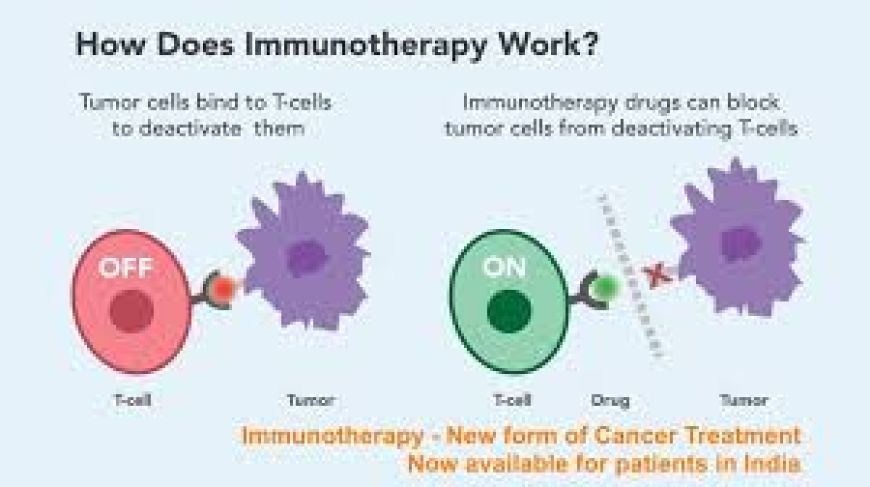What You Need to Know About Immunotherapy for Cancer Patients
Immunotherapy boosts the immune system to fight cancer, offering targeted, long-lasting results with fewer side effects. It's gaining popularity, with Immunotherapy Cancer Treatment in India becoming key to the Best Cancer Treatment in India.
Cancer remains one of the leading causes of death worldwide. While traditional cancer treatments like surgery, chemotherapy, and radiation have helped save countless lives, they often come with severe side effects and limitations. In recent years, a revolutionary form of treatment has gained momentum: immunotherapy. This promising approach empowers the body's own immune system to fight cancer. This article will provide a detailed overview of immunotherapy, its types, how it works, potential side effects, and its growing role in the healthcare landscape—particularly with respect to Immunotherapy Cancer Treatment in India.
Understanding Immunotherapy
Immunotherapy is a type of cancer treatment designed to boost the body’s natural defenses to fight cancer. It uses substances made by the body or in a laboratory to improve or restore immune system function. Unlike chemotherapy, which attacks cancer cells directly, immunotherapy helps your immune system recognize and destroy cancer cells more effectively.
This approach represents a paradigm shift in cancer care. By equipping the immune system to distinguish and destroy cancer cells, immunotherapy offers a more targeted and, in some cases, long-lasting solution.
How Immunotherapy Works
The immune system is constantly scanning the body for abnormal cells. However, cancer cells are adept at evading detection. They may produce signals that turn off immune responses or cloak themselves to avoid immune surveillance. Immunotherapy interrupts this process by:
-
Activating immune cells to recognize and attack cancer.
-
Blocking checkpoints that allow cancer cells to hide.
-
Introducing immune system proteins to stimulate a stronger response.
-
Training T-cells to identify cancer-specific antigens.
Types of Immunotherapy
There are several types of immunotherapy used in cancer treatment:
1. Checkpoint Inhibitors
These drugs block proteins that stop immune cells from attacking cancer. By disabling these checkpoints, the immune system can respond more vigorously. Common checkpoint targets include PD-1, PD-L1, and CTLA-4.
2. CAR T-cell Therapy
In this advanced therapy, T-cells are taken from the patient, modified in the lab to better recognize cancer, and then reintroduced into the patient. This method has shown significant success, especially in blood cancers like leukemia and lymphoma.
3. Monoclonal Antibodies
These are lab-made proteins that can bind to specific targets on cancer cells. Some mark cancer cells so the immune system can destroy them, while others block cancer cell growth.
4. Cancer Vaccines
Unlike preventive vaccines (like the HPV vaccine), therapeutic cancer vaccines are designed to treat cancer by stimulating the immune system to attack cancer cells.
5. Immune System Modulators
These include cytokines and other agents that boost the overall activity of the immune system.
Advantages of Immunotherapy
One of the primary benefits of immunotherapy is its ability to produce long-term remissions. Some patients experience a complete disappearance of cancer after immunotherapy and remain cancer-free for years. Key benefits include:
-
Fewer side effects compared to chemotherapy
-
Improved quality of life
-
Long-lasting protection due to immune memory
-
Effectiveness against certain types of resistant cancers
Potential Side Effects
While immunotherapy is generally better tolerated than chemotherapy, it is not without risks. The immune system, once activated, can sometimes attack healthy cells. Side effects may include:
-
Fatigue
-
Fever
-
Skin rashes
-
Diarrhea
-
Inflammation of organs like the lungs (pneumonitis), liver (hepatitis), or thyroid
It is crucial for patients receiving immunotherapy to be monitored closely so any adverse effects can be managed promptly.
Cancers Treated With Immunotherapy
Immunotherapy has proven effective against several types of cancer:
-
Melanoma
-
Non-small cell lung cancer
-
Kidney cancer
-
Bladder cancer
-
Head and neck cancers
-
Certain types of leukemia and lymphoma
Research is ongoing to extend immunotherapy's benefits to more cancer types.
Immunotherapy Cancer Treatment in India
In recent years, Immunotherapy Cancer Treatment in India has seen significant advancements. Indian oncologists and healthcare institutions are increasingly incorporating immunotherapy into cancer treatment protocols. As a result, patients now have access to world-class cancer care options that include cutting-edge immunotherapeutic techniques.
India offers several advantages for patients considering immunotherapy:
-
Cost-effective care compared to Western countries
-
Access to skilled oncologists trained in immunotherapy techniques
-
Growing participation in clinical trials that make innovative treatments available sooner
Additionally, Indian hospitals have begun to collaborate with international research institutions to stay at the forefront of cancer treatment technology.
Best Cancer Treatment in India
Choosing the Best Cancer Treatment in India involves more than just selecting a hospital. It includes evaluating the quality of care, access to new treatments like immunotherapy, availability of support services, and patient satisfaction.
Patients should consider facilities that offer:
-
A multidisciplinary approach (oncologists, radiologists, pathologists, etc.)
-
Availability of personalized medicine and genomic testing
-
A track record in advanced treatments, including immunotherapy
-
Follow-up care, including rehabilitation and survivorship support
Several Indian cities like Mumbai, Delhi, Bangalore, and Chennai have hospitals that rank high for offering the Best Cancer Treatment in India. These hospitals often serve international patients and offer specialized departments dedicated to immunotherapy.
Is Immunotherapy Right for You?
Immunotherapy is not suitable for all cancer types or patients. Whether or not you are a candidate depends on:
-
Cancer type and stage
-
Molecular markers (some cancers express specific proteins that immunotherapy targets)
-
Overall health and immune system functionality
-
Previous treatments and responses
Your oncologist will perform a series of diagnostic tests to determine if immunotherapy is the right option. In many cases, it may be used in combination with other treatments such as surgery, radiation, or chemotherapy.
The Future of Immunotherapy
The field of immunotherapy is evolving rapidly. Researchers are exploring ways to enhance its effectiveness through combination therapies, genetic engineering, and precision medicine. Areas of active research include:
-
Neoantigen vaccines: Personalized vaccines tailored to the genetic makeup of a patient’s tumor
-
Bispecific antibodies: Designed to bind to both T-cells and cancer cells to bring them together
-
Microbiome modulation: Using gut bacteria to improve response to immunotherapy
-
Artificial intelligence: Helping to predict which patients are most likely to benefit
India is increasingly becoming a part of this global research effort. This participation ensures that patients in India can benefit from the most up-to-date therapies available worldwide.
Conclusion
Immunotherapy is redefining the way we think about cancer treatment. By harnessing the power of the immune system, it offers hope where traditional treatments may fail. While not a cure-all, immunotherapy has already transformed outcomes for many cancer patients globally and is steadily gaining ground in India.
With the growing accessibility of Immunotherapy Cancer Treatment in India and an expanding network of expert oncologists, the country is positioning itself as a hub for advanced cancer care. Patients looking for the Best Cancer Treatment in India should consider centers that integrate immunotherapy into their treatment protocols, offer personalized care, and stay abreast of the latest medical advancements.
If you or a loved one is facing cancer, consult a qualified oncologist to see if immunotherapy could be part of your treatment plan. As science continues to unlock the secrets of the immune system, immunotherapy holds promise as one of the most powerful tools in the fight against cancer.


